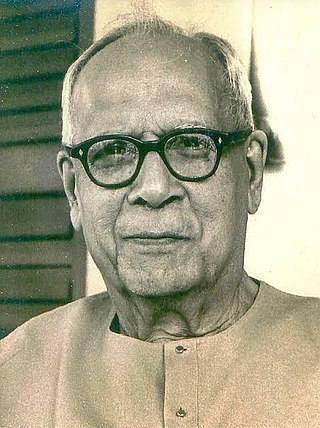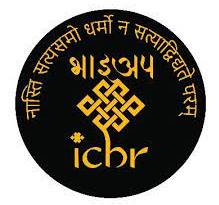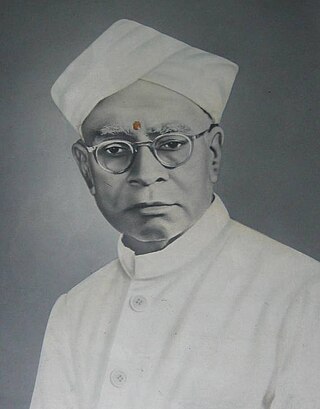Related Research Articles

The Bharatiya Janata Party is a political party in India and one of the two major Indian political parties alongside the Indian National Congress. Since 2014, it has been the ruling political party in India under the incumbent Prime Minister Narendra Modi. The BJP is aligned with right-wing politics and has close ideological and organisational links to the Rashtriya Swayamsevak Sangh (RSS) volunteer paramilitary organisation. Its policies adhere to Hindutva, a Hindu nationalist ideology. As of January 2024, it is the country's biggest political party in terms of representation in the Parliament of India as well as state legislatures.

Irfan Habib is an Indian historian of ancient and medieval India, following the methodology of Marxist historiography in his contributions to economic history. He is known for his strong stance against Hindutva and Islamic fundamentalism. He has authored a number of books, notably the Agrarian System of Mughal India, 1556–1707, an Atlas of the Mughal Empire: Political and Economic Maps with Detailed Notes, and an Atlas of Ancient Indian History. As the general editor, he is also the driving force behind the A People's History of India series, volumes of which continue to be released.
Gangmumei Kamei was a notable Indian historian and scholar of Manipur. He was also a politician in his later career, and served as a minister in the Government of Manipur.

Ramesh Chandra Majumdar was an Indian historian and professor. He principally studied the history of India.
Kishori Saran Lal (1920–2002), better known as K. S. Lal, was an Indian historian. He is the author of several works, mainly on the medieval history of India.

Swaraj Prakash Gupta was a prominent Indian archaeologist, art historian authority, Chairman of Indian Archaeological Society, founder of the Indian History and Culture Society, and Director of the Allahabad Museum. He was most noted for several excavations Indus Valley civilisation sites and for his support of the existence of a destroyed Ram Mandir underneath the Babri Masjid in Ayodhya.
Growth of Muslim Population in Medieval India (1000-1800) is a book written by K. S. Lal published in 1973. The book attempts to assess the demographics of India between 1000 CE and 1500 CE.

Ram Sharan Sharma was an Indian historian and Indologist who specialised in the history of Ancient and early Medieval India. He taught at Patna University and Delhi University (1973–85) and was visiting faculty at University of Toronto (1965–1966). He also was a senior fellow at the School of Oriental and African Studies, University of London. He was a University Grants Commission National Fellow (1958–81) and the president of Indian History Congress in 1975. It was during his tenure as the dean of Delhi University's History Department that major expansion of the department took place in the 1970s. The creation of most of the positions in the department were the results of his efforts. He was the founding Chairman of the Indian Council of Historical Research (ICHR) and a historian of international repute.
The National Council of Educational Research and Training (NCERT) is an apex resource organisation set up by the Government of India to assist and advise the central and state governments on academic matters related to school education. The model textbooks published by the council for adoption by school systems across India have generated controversies over the years. They have been accused of using Orwellian tactics to reflect the political views of the party in power in the Government of India. Recently it's been under scrutiny for saffronisation.

K. N. Panikkar is an Indian Marxist historian, associated with the Marxist school of historiography.
Biblia Impex India is a New Delhi–based book distribution company that specializes in books on Indology, Hinduism and Buddhism founded by the influential Indian historian Sita Ram Goel in 1963. It is currently managed by Goel's son Pradeep Kumar Goel.
The Indian Archaeological Society (IAS) was registered in 1968 at Varanasi as a non-governmental, non-profit making professional organization of archaeologists, founded by A. K. Narain and other Archaeologists and Indologists.

The Indian Council of Historical Research (ICHR) is a captive body of the Ministry of Education, Government of India established by an Administrative Order. The body has provided financial assistance to historians and scholars through fellowships, grants, and symposia.

Kallidaikurichi Aiyah Nilakanta Sastri was an Indian historian who wrote on South Indian history. Many of his books form the standard reference works on the subject. Sastri was acclaimed for his scholarship and mastery of sources and was a recipient of the third highest Indian civilian honour, the Padma Bhushan.
Anant Sadashiv Altekar was a historian, archaeologist, and numismatist from Maharashtra, India. He was the Manindra Chandra Nandy's Professor and Head of the Department of Ancient Indian History and Culture at Banaras Hindu University in Varanasi, India, and later the director of the Kashi Prasad Jayaswal Research Institute and University Professor of Ancient Indian History and Culture at the Patna University, both in Patna, India.

Alappat Sreedhara Menon, known as A. Sreedhara Menon, was an Indian historian from Kerala. He is best known as the State Editor (1958–68) of Kerala District Gazetteers (1961–1975). He served as registrar of the Kerala University from 1968 to 1977, before retiring in 1980.
The Akhil Bharatiya Itihas Sankalan Yojana (ABISY) is a subsidiary of the Rashtriya Swayamsevak Sangh (RSS), a Hindu-nationalist organisation. Envisioned in 1973 by Moropant Pingley, a pracharak of the RSS, and founded in 1978-79, ABISY holds that India's history was distorted by the British Raj, and seeks to correct the biases. Scholars state that the actual aim of the organisation is to rewrite Indian history from a Hindu nationalist perspective.
Yellapragada Sudershan Rao is an Indian historian, who was appointed as the chairperson of the Indian Council of Historical Research (ICHR) by the Government of India, serving from July 2014 to July 2017. He was formerly a professor of history at Kakatiya University in Telangana, and had previously served as a member of the ICHR. He was a member of the Akhil Bharatiya Itihas Sankalan Yojana, an affiliate of the Hindu-nationalist Rashtriya Swayamsevak Sangh (RSS), and the head of its Andhra Pradesh branch.

Suraj Bhan (1931–2010) was an Indian archaeologist and professor of archaeology. His academic work was said to bear a deep imprint of Marxism. He was also involved with the work of Communist Party of India (Marxist) in Haryana and took particular interest in the People's Science movement.

Historiography is the study of the methods of historians in developing history as an academic discipline, and by extension is any body of historical work on a particular subject. The historiography of a specific topic covers how historians have studied that topic using particular sources, techniques, and theoretical approaches. Historiography is defined as "the study of the way history has been and is written – the history of historical writing", which means that, "When you study 'historiography' you do not study the events of the past directly, but the changing interpretations of those events in the works of individual historians."
References
- ↑ "Executive Committee of the Indian History and Culture Society".
- ↑ Rudolph, Lloyd I.; Rudolph, Susanne Hoeber (1983). "Rethinking Secularism: Genesis and Implications of the Textbook Controversy, 1977-79". Pacific Affairs. 56 (1): 15–37. doi:10.2307/2758768. JSTOR 2758768.
- ↑ Gottlob, Michael (2011), History and Politics In Post-Colonial India, OUP India, p. 24, ISBN 978-0-19-908849-2
- ↑ Pearson, M.N. [doi:10.2307/602607 "Problems of Indian Historiography"]. Journal of the American Oriental Society. 3 (101): 381. doi:10.2307/602607. JSTOR 602607.
{{cite journal}}: Check|url=value (help)